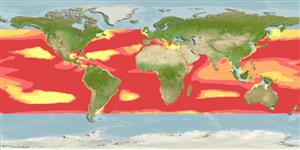Preferred temperature (Ref.
115969): 5.4 - 14.9, mean 10.1 (based on 1190 cells).
Phylogenetic diversity index (Ref.
82804): PD
50 = 0.5312 [Uniqueness, from 0.5 = low to 2.0 = high].
Bayesian length-weight: a=0.01230 (0.00690 - 0.02192), b=3.09 (2.93 - 3.25), in cm Total Length, based on LWR estimates for this species & (Sub)family-body (Ref.
93245).
Trophic level (Ref.
69278): 3.4 ±0.45 se; based on food items.
Daya lenting (Ref.
120179): Tinggi, Waktu penggandaan populasi minimum kurang dari 15 bulan (K=3.03; tmax=1.5).
Fishing Vulnerability (Ref.
59153): Low vulnerability (10 of 100).
